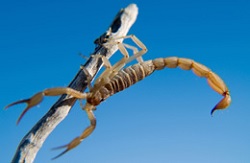 |
| Bark scorpion--Courtesy of Rare Disease Therapeutics |
Three years ago, the FDA approved Anascorp, the only scorpion antivenom available in the U.S. It only gets used about 250 times a year, but most of those cases involve children and they can be fatal. Now the FDA has found problems at the Mexican plant where the drug is manufactured, listing more than a dozen observations in a recent warning letter.
The letter, posted last week by the FDA, was for a 10-day inspection that took place in January at the Instituto Bioclon in Mexico City. Bioclon, which has made the drug for years for the Mexican market, is the manufacturing partner of Franklin, TN-based Rare Disease Therapeutics, which has sold the treatment under license in the U.S. since 2011.
"We are concerned that procedures have failed to follow FDA expectations," Jude McNally, medical science liaison, director for Rare Disease Therapeutics, said when contacted Monday. As soon as it received the Form 483 in January, Bioclon "immediately" started dealing with the FDA's concerns, McNally said: "We are looking for a very rapid resolution."
The 15 observations criticized the facility for a variety of shortcomings, including poor sanitation practices, not controlling the temperature of the vial-filling area, failing to investigate batch failures and not making sure a failed batch was tagged and taken out of a warehouse. It also noted that the only entrance and exit from a separate animal drug area was right through the Anascorp production area, leaving open the chance for cross-contamination. The warning letter noted there were not enough employees to handle all of the required work involved in the manufacturing process and that many of those, including supervisors, were poorly trained.
There are about 20,000 stings a year in the U.S. from about 60 species of scorpion, but according to Rare Disease Therapeutics, only the bark scorpion's sting "will cause clinically significant systemic symptoms." And that is the sting that Anascorp is designed to treat. Many of those incidents happen in rural areas, but before the antivenom was available, victims had to be transferred to major medical facilities, delaying treatment and extending the consequences. McNally said no shortage of the drug is anticipated.
Rare Disease Therapeutics came in for some criticism shortly after the drug's U.S. approval in 2011 when it was discovered that the drug, which the company sold to wholesalers for $3,500 a dose, cost only about $100 a dose in Mexico. Some patients paying for it through hospitals had been billed for tens of thousands of dollars. The company defended its price as necessary to keep the product available and explained that there were added expenses for Bioclon to manufacture it to FDA standards.
- here's the warning letter